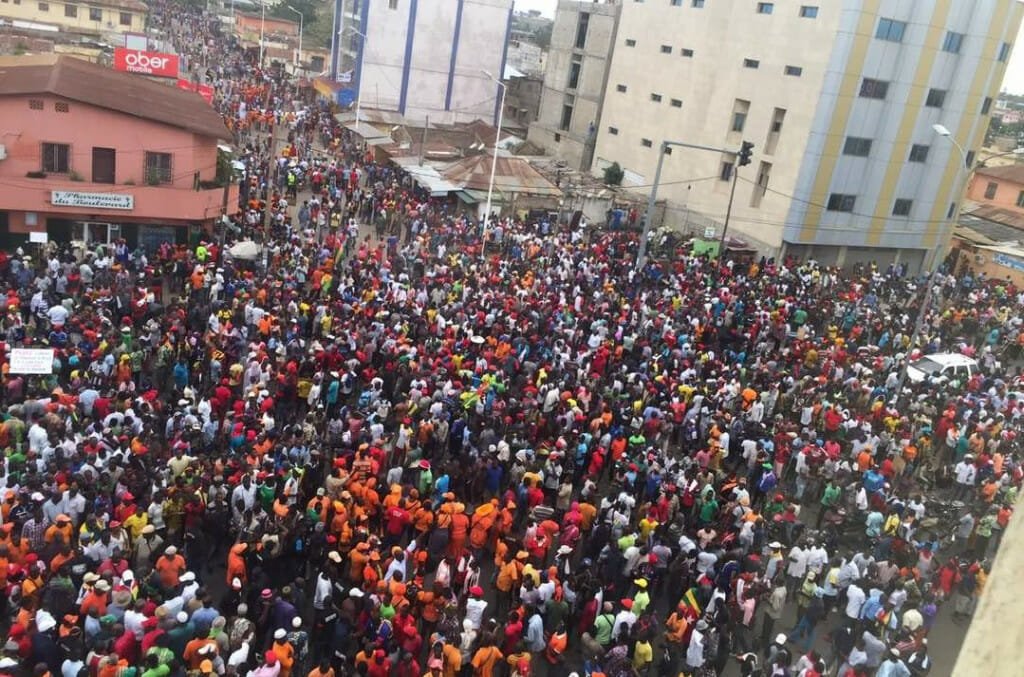President Faure Gnassingbé declared winner of Saturday’s election

BY LOU SIFA
Sunday, the day following the presidential election in Togo, the president of the Togolese Independent National Electoral Commission, Tchambakou Ayassor, stated in a communique that his office will announce the provisional results of the voting today, Monday, by 8 p.m. It didn’t take that long, for, at 2 in the morning, the commission declared the incumbent president, Faure Gnassingbé, the winner, thereby contradicting the claims by the president’s main challenger, former prime minister Agbéyomé Kodjo, who declared himself the winner Sunday.
According to the commission, President Faure Gnassingbé received 72.36% of the votes, way ahead of Agbéyomé Kodjo who is credited with only 18,37%. The president has won with more than 16 points compared to the 2015 election where he won by 61%. The turn-out rate was 76.63%, a hefty 14 points higher than the 2015 election. The Constitutional Court is expected to confirm these provisional results within six days, at which time the incumbent president will be mandated to serve a new term.
International observers dispatched by the African Union and the Economic Community of West African States confirmed the election result today.
While the electoral commission was announcing the results, Agbéyomé Kodjo’s residence was once again surrounded by security forces, as it was the day before.
The announcement of President Gnassingbé’s victory after the first round of voting came in sharp contrast to Kodjo’s claim of victory. Yesterday, in a video made available to the press, Kodjo, who said he has received between 57% and 61% of the votes, stated: “I therefore become the democratically-elected president, and I pledge to form an inclusive government. I seize this opportunity to congratulate Faure Gnassingbé who thus becomes the first living former president in the history of Togo, and invite him to show patriotism so that the transfer of power can happen in peace and in accordance with the rules.”
Kodjo also congratulated the security forces “for their neutrality and their impartiality,” and vowed to “strictly deliver on my campaign promises as soon as I take office.”

Political power in Togo has so far been wielded by President Gnassingbé’s family for fifty-three years. Faure Gnassingbé succeeded his father, Gnassingbé Eyadéma, who had ruled the country for 38 years and died in office. The son rose to the presidency in 2005 after a flawed election that triggered large-scale violence, causing between 300 and 500 deaths, according to the U.N. Faure Gnassingbé, 53, who holds an MBA from The George Washington University in Washington, D.C., won re-election in March 2010—yet another contested election—and a second re-election five years later that the opposition claimed was also stolen.
Popular uprising has been a pretty regular occurrence throughout President Gnassingbé’s tenure so far. The regime faced its worst crisis in 2017 and 2018 when demonstrators took to the street for two months in a row by the thousands to demand the president’s resignation.
The furious crowds on the streets of Lome, Sokode and other cities chant “Down with Faure!” “Faure out!” while burned tires, barricades, tear gas and real-bullet shootings paint the picture of a war zone.
Not only were the demonstrations unprecedented in terms of the size of the crowds and their duration, two of the main theaters is the second largest city of Sokode, which had traditionally aligned itself with the northern region, the home of the Gnassingbé family. For the first time, even the Gnassingbes’ home town of Kara witnessed demonstrations.
Not unlike other African countries, politics in Togo operates largely along ethnic lines. Sokode is home to the novel, charismatic leader of the massive uprising, Tipi Salifou Atchadam, 52, president of the National Pan-African Party, a rather unknown entity in Togo’s political theater until then.

An eloquent former student leader who masters the art of capitalizing on the youth’s frustrations stemming from high unemployment and poverty, Atchadam decided not to go it alone. Rather, he joined hands with the traditional opposition led by Jean-Pierre Fabre of the Union of the Forces for Change, UFC. (UFC was founded and formerly led by Gilchrist Olympio, the son of Togo’s charismatic first president, Silvanius Olympio. Gilcrhist Olympio, who was a thorn in the side of former President Eyadema for decades, made peace with the former president’s son and current president, causing a rift between Fabre and him, but Fabre fought to keep the leadership of the party, with the new name ANC.)
It all ended with a modification of the constitution limiting the president’s mandate to two five-year terms going forward. Therefore, the constitution allows the president to seek re-election this year and and again in 2025.

